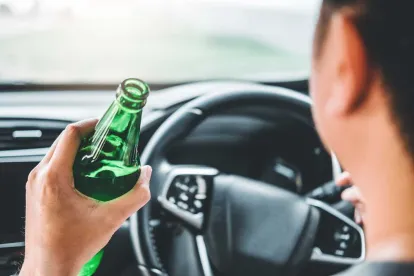In an instant and without warning, a driver under the influence can cause a serious, and oftentimes fatal, car accident. This wreck may change your life, or a loved one's life, forever.
In the United States, approximately 32 people die every day in drunk-driving crashes (or one person every 45 minutes). According to the National Highway Traffic Safety Administration (NHTSA), these numbers have only increased in recent years. For example, in 2020, alcohol-impaired driving traffic deaths totaled 11,654, which was a 14% jump from 2019. Drug impairment also causes car accidents. According to NHTSA, 56% of drivers who were involved in serious injury and fatal crashes tested positive for at least one drug.
As detailed below, accidents caused by an impaired driver present unique circumstances, and time is truly of the essence when hiring a personal injury attorney. An attorney can work to secure evidence, locate the vehicle, interview witnesses, trace an impaired driver's steps leading up to the wreck, communicate with insurance companies to navigate all of the applicable coverage, and engage with law enforcement regarding any investigation of or charges against the impaired driver.
Compensatory Damages and Punitive Damages
If you are injured due to the negligence of another driver, you are entitled to recover compensatory damages. These damages are designed to make you "whole" under the law. Compensatory damages may include incurred medical expenses, future medical expenses, lost wages, diminished earning capacity, pain and suffering, scarring or disfigurement, loss of use of part of the body, or the permanency associated with any continuing injuries. These damages are determined by the parties, a judge, or a jury, which result in a reasonable amount of compensatory damages based on the specific facts of the case.
In addition to compensatory damages, if your injuries are caused by a driver who is operating their vehicle while under the influence of alcohol and/or drugs, you may also be entitled to punitive damages. Unlike compensatory damages, punitive damages are not meant to make you "whole." Instead, they have two specific policy goals: (1) punishing defendants for egregiously wrongful acts, and (2) deterring the defendant, and others, from committing such wrongful acts. There is also no strict cap on the amount of punitive damages in drunk driving cases.
Multiple Parties
Individuals other than the at-fault driver may also be liable when the at-fault driver is driving while under the influence.
Dram Shop Claim. Under North Carolina law, it is illegal for an establishment to serve alcoholic beverages to patrons that it knows, or should have known, are intoxicated. A dram shop claim may be available where an intoxicated, at-fault driver was previously at a bar, restaurant, or other establishment and served alcoholic beverages. It is imperative to act quickly in these situations in order to recover any potential video footage, witness statements, and other evidence of the intoxicated driver's consumption at the establishment.
Social Host Liability. Under North Carolina law, a private third-party, such as the host of a party, may be liable for the damages caused by an intoxicated driver. If the intoxicated driver consumed alcohol at a private party or gathering, and the host of such gathering provided the alcohol to the driver, was aware or reasonably expected to be aware that the person was intoxicated before leaving the gathering, and was aware that the intoxicated person would be driving upon leaving, the host may be liable for the damages caused by the intoxicated driver. Again, it is imperative to act quickly in these situations to preserve as much evidence as possible.
Vicarious Liability and Other Third-Party Considerations. If an at-fault driver is operating someone else's vehicle, the owner of the vehicle may also be liable. Under North Carolina law, there is a presumption that an individual operating someone else's vehicle is doing so with the owner's authority, consent, and knowledge. Therefore, this presumption of agency also may hold the owner of the vehicle liable for an at-fault driver's actions. Similarly, if the at-fault driver was operating the vehicle in the course and scope of employment, the at-fault driver's employer may be liable. In addition, a vehicle owner, family member, or employer may be liable for negligent entrustment when they allow someone to drive when they know, or should have known, that person was dangerous (including due to intoxication). Employers likewise can be liable for negligent hiring, supervision, or retention in the case of employees who pose a risk to other drivers based on prior conduct or other warning signs that they may drive under the influence.
Conclusion
Sadly, everyday people find themselves in horrible crashes due to drunk drivers or other decisions to drive while under the influence. Navigating a car accident can be extremely difficult and overwhelming. A skilled, experienced personal injury attorney can help with this process. Although no amount of money can fix the situation, a personal injury lawyer can work to ensure that you receive all of the compensation and assistance you are legally entitled to receive under North Carolina law.




 />i
/>i

